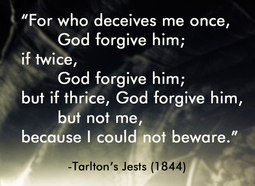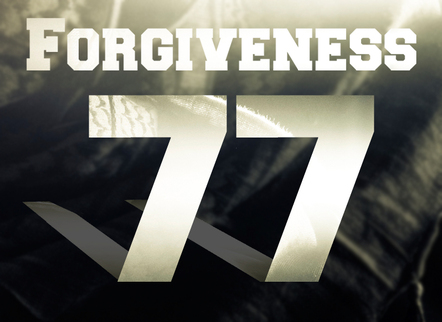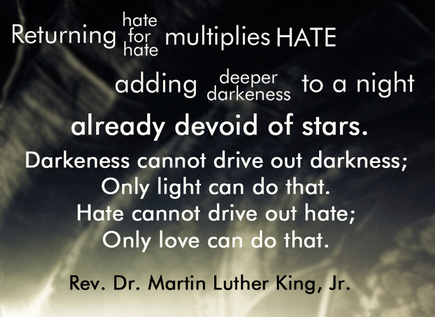|
Matthew 18:21-35 CEB Then Peter said to Jesus, “Lord, how many times should I forgive my brother or sister who sins against me? Should I forgive as many as seven times?” Jesus said, “Not just seven times, but rather as many as seventy-seven times. Therefore, the kingdom of heaven is like a king who wanted to settle accounts with his servants. When he began to settle accounts, they brought to him a servant who owed him ten thousand bags of gold. Because the servant didn’t have enough to pay it back, the master ordered that he should be sold, along with his wife and children and everything he had, and that the proceeds should be used as payment. But the servant fell down, kneeled before him, and said, ‘Please, be patient with me, and I’ll pay you back.’ The master had compassion on that servant, released him, and forgave the loan. “When that servant went out, he found one of his fellow servants who owed him one hundred coins. He grabbed him around the throat and said, ‘Pay me back what you owe me.’ “Then his fellow servant fell down and begged him, ‘Be patient with me, and I’ll pay you back.’ 30 But he refused. Instead, he threw him into prison until he paid back his debt. “When his fellow servants saw what happened, they were deeply offended. They came and told their master all that happened. His master called the first servant and said, ‘You wicked servant! I forgave you all that debt because you appealed to me. Shouldn't you also have mercy on your fellow servant, just as I had mercy on you?’ His master was furious and handed him over to the guard responsible for punishing prisoners, until he had paid the whole debt. “My heavenly Father will also do the same to you if you don’t forgive your brother or sister from your heart.” "If they won’t pay attention even to the church, treat them as you would a Gentile and tax collector." Jesus' words still hung in the air. What did he mean? Was he talking about how the general public treated Gentiles and tax collectors or how Jesus treated them? Jesus ate with them, healed them, loved them. The General Public ostracized and cut them off. The answer lies in Peter. When he was acting rightly he was the rock, the cornerstone for the early church. Listen again to Peter's words, “Lord, how many times should I forgive my brother or sister who sins against me? Should I forgive as many as seven times?” This question is important because we see how Peter saw Jesus' comment. We should love those who hurt us. Turn the other cheek. September 11th is one of those days where you remember exactly where you were and what you were doing. I was in the parking lot at my college when the first plane hit the first tower. As I remember, no one thought it was a terribly big deal. They thought it was a tragic accident. Little did they know. By the time I finished my first class a second plane hit the second tower, and we knew: this was not an accident. I can still remember walking past the big screen televisions in the community center; watching twenty to thirty students staring in horror as they saw the aftermath of the fallen towers in real time. Fear gripped us all. We had no idea if the attacks were over, or just beginning. Was it safe to drive home? Was it safe to stay put? We didn't know. I remember the fear and confusion following the attacks. Some ran to church the following Sunday while others asked if God was callous to allow such pain and suffering. Some wondered if God existed at all. Some said the attacks were part of God's divine plan. People purchased the Iraqi "Most Wanted" playing cards, and would gleefully removed or marked the ones when the United States "got one." Three years ago, at the 10 year anniversary, I knew our feelings were still raw. When Seal Team 6 took out Osama Bin Laden, people took to the streets and celebrated. An eye for an eye. Justice had been rendered. In one of his sermons, Martin Luther King said something profound: This pre-9/11 man lived in the deeper darkness. He personally knew the truth of inequality and hate. His family suffered terror attacks on his house, threatening to destroy his family if he didn't cease to preach. In those moments it is easy to show hate for hate and anger for anger. Yet, he knew anger only added to the darkness of a night already devoid of stars. Love was the real answer and love can only come with forgiveness. That alone, for me, is a weighted mandate. In our woundedness, it is natural to bite back in reaction. When we are dealing with woundedness and reactionary impulse... well, it's difficult. I get it, because I've been wounded. I know how it feels.  How many times one should forgive is a question for the ages. You have heard the phrase, "Fool me once shame on me, but fool me twice shame on you.There is a Jewish tradition of forgiveness being given in triplets. To forgive that much one was considered to have a generous spirit.. This kind of forgiveness mirrored God's forgiveness to Gideon and to Israel. Even Job talks about God forgiving in this manner. So, Peter's suggestion of forgiving seven times must have seemed more than generous. And, let's not discount Peter's clever use of the number seven. SEven was considered a holy and perfect number. God rested on the seventh day after creating the heavens and the earth. Samson's long locks were braided in seven plaits. The walls of Jericho fell after seven priests marched around the city seven times; blowing their seven trumpets. It is a perfect number and Peter was asking, in a roundabout way, if we should forgive perfectly. Jesus wasn't seeking perfection, as if forgiveness was some formula or recipe. We can all do somethings perfectly if we put our mind to it. Some of us can bake the perfect cake, some of us can rebuild the perfect engine, perhaps some of us can pull a perfect score from a level in a video game. We can perfect our daily routine, or say the perfect thing to someone in need. In many ways those are things that are perfected by rote or paying attention to directions. Forgiveness doesn't happen that way. Forgiveness is organic and messy. It's not perfect, it's beyond perfect. When we seek honest forgiveness from God there is no limit to the amount we will be forgiven. It is an unimaginable debt being taking from us all the time. Unlike Gideon and Israel this forgiveness is greater than three and unlike Peter's query it is greater than seven. This forgiveness is eternal. It is a debt we can't ever be able to repay. It's as if we owe billions in back taxes. No normal human could pay that kind of debt, yet God forgives it. That forgiveness is beyond perfection. Yet, we are the ungrateful servant. We are forgiven but we see someone who has done something against us and we can't bring ourselves to show the same love and compassion. And, don't think that Jesus was minimalizing the second person's sin. He owed the first person a 100 days worth of wages. Take your yearly earnings and divide by three. Imagine owing that kind of debt to someone else. It is doable but not easy. Yet, instead of seeing how reconciliation was possible the first servant wants vengeful justice: an eye for an eye... Hate cannot drive out hate. A new kind of darkness fell over much of the world on September 11th. No longer could evil be tied to a specific dictator or tyrannical leader and no longer could American soil be considered a safe place from such evil. We could have searched for a face to begin the path of forgiveness, to not let sin beget sin; instead we searched for a face to exact revenge. It all made sense thirteen years ago. The American reaction was sudden. It was as if the planes on that day were a foot and we were the ant pile. On September 10th we were complacent and content in our home but once our home was kicked up we attacked. It was a knee jerk reaction, and an honest reaction to pain and suffering. It was a reaction that cost us. The War in Afghanistan has cost far more lives from multiple sides than the initial attacks on 9/11... Darkness cannot drive out darkness. Just as Peter was clever in using the number seven, Jesus was clever in using the number seventy-seven. The problem with Peter's number is it has a conclusion, a finality to it. You can choose to forgive someone but if you are keeping track just how many times you should forgive than you are not doing it authentically. It is like promising to give someone fifteen minutes of your time and all the while you are staring at the clock. Perhaps you are doing everything the person asks of you perfectly but you are not truly giving your time. Once again, you might be able to forgive 'perfectly' seven times but you wouldn't be forgiving correctly. Jesus uses the number seventy-seven because it was a number one couldn't keep track of. In other words, we shouldn't be thinking about when we need to stop forgiving in the middle of our forgiveness. In that case, even if we say and act everything perfectly we never really mean it. So now what do we do? Today, thirteen years after the initial event, our collective memory is still raw and hurt. We need to start putting stars back in the night sky until the dawn arrives. We need to forgive those who hurt the world's psyche so much on September 11th. And maybe that is just the first step. Maybe we need to look into our hearts and really understand who we need to begin forgiving in our personal lives. Forgiveness does more than just help the person you are forgiving. Forgiveness brings your heart right with God. It not only heals the person who has acted out in sin but heals your wounds as well.
|
Categories
All
Archives
October 2023
|





 RSS Feed
RSS Feed